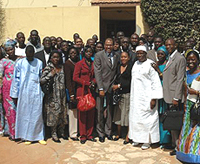
Feature Story
Leadership in Senegal’s AIDS response
09 April 2009
09 April 2009 09 April 2009
Michel Sidibé UNAIDS Executive Director and representatives from national civil society organizations and regional networks of people living with HIV after their meeting at SIDA Service, 9 April 2009.
Credit: UNAIDS/C.Diop
UNAIDS estimates that one per cent of adults in Senegal are living with HIV. In 1992, at a time when the full impact of AIDS on society was only beginning to be recognised in the country, the Catholic church in Senegal founded “SIDA Service,” an organization to support and care for people living with or affected by HIV.
Since those early days, and continuing today, it actively seeks to change peoples’ attitudes of stigma towards, and discrimination against, people living with HIV.
SIDA Service has grown to 500 volunteers and employees with 23 branches across Senegal as well as a presence in neighbouring Guinea Bissau and Gambia. Its Dakar health centre was the first in the country to offer HIV testing that is free, voluntary and confidential. In addition to voluntary counselling and testing and support to people living with HIV, SIDA Service also cares for orphans and vulnerable children.
While in Senegal this week, UNAIDS Executive Director Michel Sidibé visited the SIDA Service’s health centre which is making a significant the contribution towards Senegal’s goal of universal access to HIV treatment, prevention, care and support. His visit took place on Wednesday 8 April where he had an opportunity to listen to those who use the services.
The medical team at the centre offer a range of services to the local community including HIV treatment, treatment of opportunistic infections, gynaecological health and pre-natal services. There is a laboratory for biomedical analysis and an on-site pharmacy. In addition to health care, food support is available and staff and volunteers offer time to listen as well as give counselling, psycho-social support and spiritual care to any in need.
SIDA Service has also led in promoting dialogue within faith communities on AIDS. It has co-organized a number of important conferences and gatherings of religious communities on AIDS in Africa and was a founding member of the National Alliance of Religious and Medical Experts against AIDS in 1999.
Mr Sidibé also met with civil society leaders in Senegal as well as from wider the West Africa region.
President Abdoulaye Wade

President Abdoulaye Wade of Senegal (front right) hosted a meeting with Michel Sidibé UNAIDS Executive Director. Also present were (from left) Dr Meskerem Grunitzky Bekele, Director, UNAIDS Regional Support Team for West and Central Africa; and United Nations Resident Coordinator Mr Bouri Jean Victor Sanhouidi.
Credit: UNAIDS/C.Diop
Later on Wednesday Mr Michel Sidibé met with Senegal’s President Abdoulaye Wade where they discussed Senegal’s progress in the national AIDS response. The country has made good progress in access to HIV treatment in recent years with 56 per cent of people in need of HIV treatment accessing it in 2007, up from 26 per cent in 2004.
Mr Sidibé also met with the Senegalese Minister of Health Dr Safiatou Thiam.
Regional Dialogue on Universal Access in West and Central Africa
On Thursday, Mr Sidibé opened a Regional Dialogue on Universal Access in West and Central Africa.
The Dialogue was chaired by Dr Thiam and brought together senior government and UN officials, civil society from across West and Central Africa including representatives from networks of people living with HIV, representatives from donor countries and the Global Fund.
Addressing the gathering Mr Sidibé urged participants to work together to achieve universal access which he said “is more than a motto but a way to bring about fundamental transformation.”
He called for AIDS to remain a political priority of governments in the region and emphasized the need for an expansion of HIV prevention efforts. Expanded partnerships including with the women’s movement, TB community, others working on development goals, are key to the strategy of universal access he proposed. Mr sidibé also called for respect for human rights: “I ask the UN system, governments and civil society to come together to build a response to HIV that does not drive people underground through fear of the criminal law”.
Dr Luis Gomes Sambo, Regional Director for Africa, WHO; Mr Jean-Christophe Deberre, Deputy Regional Director for West and Central Africa, UNDP; and Dr Meskerem Grunitzky Bekele, Director, UNAIDS Regional Support Team for West and Central Africa also spoke.
Mr Sidibé will conclude his visit later today by meeting with the First Lady of Senegal, Ms Viviane Wade who is a long term advocate on AIDS and health issues in her country and an active member of Organization of African First Ladies against HIV/AIDS.
Right hand copntent
Feature stories:
ICASA 2008 3-7 December 2008 (07 December 2008)
Understanding HIV transmission for an improved AIDS response in West Africa (03 December 2008)
Press centre:
UNAIDS and broad coalition working towards the release of nine men who have sex with men in Senegal who have been convicted and imprisoned (15 January 2009
Multimedia:
External links:
Organisation of African First Ladies against HIV/AIDS
Publications:
Senegal 2008 UNGASS Country Progress Report (French only)
The Alliance of religious and medical experts in the response to the AIDS epidemic in Senegal. The medical, coranic and biblical principles that every religious believer should read, know and apply (pdf, 365 Kb) (in French)


